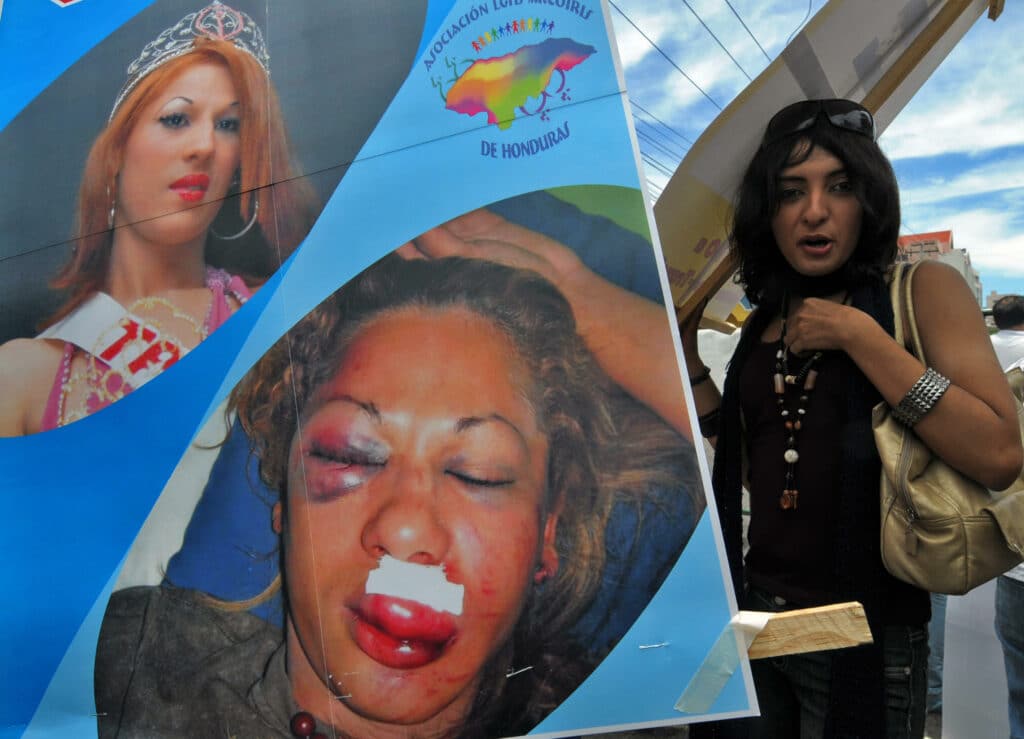Honduras government to blame for well-known trans sex worker’s murder, top court rules

Vicky Hernández was shot and killed by Honduras police during the country’s coup d’état in June 2009. (Red Lésbica Cattrachas)
A top international court ruled Monday (28 June) that Honduras state was responsible for the slaying of Vicky Hernández in 2009 by government forces.
The Inter-American Court of Human Rights, a regional court based in Costa Rica, has ordered the Honduran government to continue its investigation into the killing of Hernández, a 26-year-old trans sex worker.
Vicky Hernández was found shot in the eye, a used condom beside her body, on 28 July in a San Pedro Sula street during the throes of a US-backed coup to overthrow left-wing president Manuel Zelaya.
She was allegedly killed by public safety forces, witnesses claimed during testimonies last year, pointing towards a curfew that meant only police and military were allowed to roam the streets. The government’s lawyers denied its forces played a role.
But the petitioners acting for the deceased, Cattrachas Lesbian Network and the Washington-based RFK Human Rights, said that the government bore direct responsibility for Hernández’s death.
And on the 12th anniversary of the coup d’état, the court for the first time ruled that a country’s government has failed to protect a trans civilian.
👩🏿⚖️👨🏿⚖️#Judgment Case of Vicky Hernández et al. v. Honduras 🇭🇳. The @IACourtHR declared that the State of Honduras is responsible for the death of Vicky Hernández, trans woman, sex worker and well-known activist.
👩🏿💻More info here: https://t.co/8KEpm2wz7h #ProtectingRights pic.twitter.com/gHkszPP4a1
— Inter-American Court of Human Rights (@IACourtHR) June 28, 2021
The government was ordered to enact sweeping measures to clamp down on violence against LGBT+ folk, including legally recognising trans people by allowing them to change gender markers on identity documents and public records.
It was also told to publicly acknowledge its role in her death and pay $30,000 in reparations to Hernández’s family. A scholarship fund for trans women should also be set up in her name, the court added.
The court also called on the government to restart its investigation into Vicky Hernández’s death – 12 years on, and investigators still have not yet carried out forensic tests.
It also remains unclear whether local authorities even conducted an autopsy or interviewed witnesses. Police wrote off the case as a crime of passion.
Her case had been muddied by delays, negligence and inertia, activists argued in the lawsuit, who said she was the victim of an extrajudicial killing.
The court’s ruling sets a seismic legal precedent that activists hope will finally put an end to the pattern of abuse and violence that defines Honduras, one of the deadliest countries in the world to be LGBT+.
Trans Hondurans have a life expectancy of just 30 to 35 years, according to United Nations experts. No wonder, activists warily warn, considering the country carries the world’s highest rate of trans homicides.

LGBT+ activists protest against police abuse in Honduras in 2009 (ORLANDO SIERRA/AFP/ Getty)
Such spates of violence that have long haunted trans Hondurans must now be tracked by law enforcement, the ruling says. Security forces must also be offered diversity training to better protect LGBT+ civilians.
The Honduran government has yet to comment on the court order – the next step, campaigners say, is to ensure it complies with the ruling fully.
After all, the Inter-American Court of Human Rights, one of the most important human rights monitoring bodies in the western hemisphere, ruled in 2018 that marriage equality must be recognised across Latin American and the Caribbean – Honduras included.
But the advisory opinion has been vastly ignored by Honduras’ highest courts. LGBT+ activists filed two lawsuits to strike down an article of the constitution that bans marriage equality – the Supreme Court rejected one while another remains pending.
Nevertheless, activists welcomed the Inter-American Court of Human Rights’ ruling on the murder of Vicky Hernández.
The decision becomes a road map for other states, a road map on what they need to do to be compliant with their international human rights obligations,” RFK Human Rights vice president for international advocacy and litigation Angelita Baeyens told The New York Times.
“This is definitely a victory. A victory for justice, a victory for LGBT+ rights collectives and movements in Honduras and across the region.”
She added: “It’s the first stage of the process that has been won.
“The fight is not over.”

